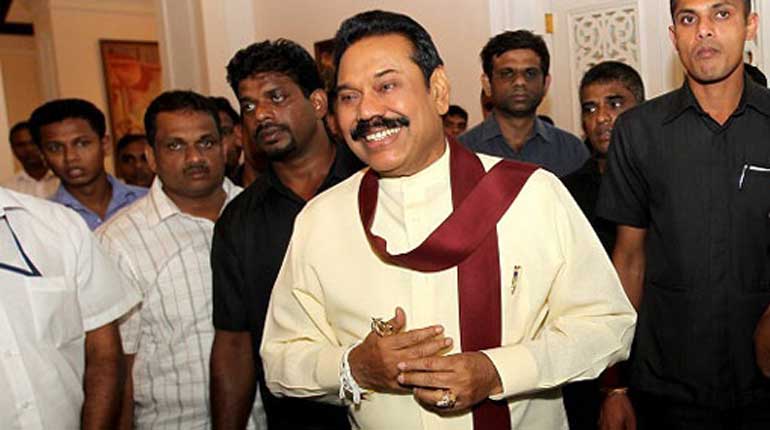Friday Feb 13, 2026
Friday Feb 13, 2026
Thursday, 12 May 2016 00:00 - - {{hitsCtrl.values.hits}}

How absurd the whole issue has become was demonstrated recently when certain politicians demanded that former President Mahinda Rajapaksa be provided with massive Army security, indefinitely
About 10 years back I was introduced to this person at a restaurant. He had just returned from America, having lived there for a  lengthy period. Like most returnees from cosmopolitan societies, he was confident, casual, conversed easily; listening politely and expressing himself moderately. To my ear, in his words there was nothing to suggest an unusual interest in local politics or even domestic issues.
lengthy period. Like most returnees from cosmopolitan societies, he was confident, casual, conversed easily; listening politely and expressing himself moderately. To my ear, in his words there was nothing to suggest an unusual interest in local politics or even domestic issues.
Perhaps, I did not listen as attentively as I ought to have, and failed to read between the lines. During that conversation of less than half an hour, he volunteered that he was a close relative of a person who had one time been a big name in the public service. In fact, they shared the surname. He also told me that he hails from down south, meaning the Southern Province. I think he used the word “deep” instead of “down”, with a certain stress.
Although in this little island, it only means about 100 miles south of Colombo, there was a deeper, ‘political’ meaning in the stressing of the location I felt. More importantly, he let it be known, kind of vaguely, with an emphasised modesty, that he had filial connections with President Mahinda Rajapaksa, who had been President only for a few years then.
The next time I met him was about six months later and the meaning of the things he had said at the earlier meeting, the unsolicited personal information given, became clear. There was an enormous transformation in the guy now. His style of his dress had changed; the well-creased trouser, sparkling white kurta type top, expensive watch, thick coils of holy thread around the wrist, leather sandals, announced a public figure.
The man, after a lengthy sojourn in the West, having armed himself with a qualification, had sacrificed a comfortable life there to return to his people, to his ancestral village to work for their betterment, to provide direction to the masses. He carried a “big” name and could claim connections to the political leadership of the country. There are no better qualifications for a public life.
Unlike the earlier time, now he had an entourage, about three big-made men, white shirt, dark trouser, obviously guarding, following and fussing over him. I asked him what had happened since we last met. Apparently, he had met President Mahinda Rajapaksa, who had appointed him a chief organiser for an electorate in the south (deep). Even his conversation style had changed, verbose, yet measured and portentous. The three bodyguards were part of his entitlements. I haven’t cared to meet the American returnee after that. A recent news item said that he had abandoned Mahinda Rajapaksa and joined the Government ranks.
A bodyguard’s life
For some reason, I cannot think of our politicians without the image of the three bodyguards coming to mind. With his ceaseless comings and goings, guarding a politician, while coping with the sweltering heat, dust, traffic, and the daily throng is not easy and certainly not pleasant. Maybe their educational qualifications do not open any other path for them. These bodyguards have leveraged their physical attributes to make a career. Their duties are not to be envied.
It is ironic that Mahinda Rajapaksa now has to ask for more security guards when he was so free with allocating them to all and sundry. Long after the war ended, the LTTE utterly destroyed, not a single terrorist act reported for nearly six years, bodyguards were galore; Sri Lanka apparently remained a deadly place with unknown, unidentified threats lurking in every dark corner. So stealthy were the potential evil-doers, none have ever been discovered and no intricate plot unravelled.
The list of those who needed protection was incredibly lengthy; members of Parliament, provincial councillors, high officials, electoral organisers, judges, some journalists, high-ranking officers of the armed forces, family members of politicians were among those allocated security at the expense of the State.
Mind you, it is not only the emoluments of the bodyguards, but there is a whole structure of costs involved here; logistics, vehicles, communication equipment to even the disgraceful inconvenience caused to the general public by the speeding motorcades of the protected and their rushing entrances and exits. It is farcical to imagine that all these people were under threat from the unknown source. The only logical explanation being that this was only a vulgar show of favour by the powers that be, a naked abuse of discretion.
 Moral blame
Moral blame
However, when it comes to assigning moral blame, the picture is cloudy, because it was always open for the person assigned this meaningless ‘status symbol’ to have declined. There was no need for him to be a captive of a cheap scheme calculated to obligate him. Regrettably, the truth is that many of the beneficiaries had no real honour, stature or justification, and therefore needed the mock creation of an image, which the bodyguards were expected to provide.
The making of this false status came at a price, principally to the country and of course those called upon to provide the service. A person joins the armed forces with the assumption that he would be serving the State of Sri Lanka, in an honest and honourable capacity. It is possible that in the course of his duties he may be called upon to provide security for a not-so-desirable person, but that should only be an exception. Otherwise, the young soldier should have the confidence that the person he is guarding is worthy of that honour. Not to put too fine a point to it, the State is a moral institution.
If the State is not a moral institution, it has no business to fight corruption, have a Bribery Commission, maintain a Police force or even have courts of law. They can do all that only because we assume that the State acts with a moral responsibility, without which there is no legitimacy in any of these.
Was this moral responsibility exercised duly when bodyguards were assigned so freely during the Mahinda Rajapaksa regime? For example, a high official negotiates to purchase weapons for the Army. In to these negotiations he works in a secret commission for himself. Because he stands to benefit personally from the deal he lowers the required criteria for the weapons. Even the tender is redesigned. At the end, the Army ends up with poor quality weapons. But while he is indulging in these corrupt deals, the man, as he is an official of the State, is given bodyguards from the Army.
The same goes for a politician or official who is corrupt, a bribe-taker, a thug, a wheeler-dealer, a blackguard. On the one hand, State institutions like the Bribery Commission are designated to investigate him; while on the other hand, the same State is providing him bodyguards at our expense. Men of a superior culture, meaning, law abiding and decent Army officers are ordered to provide security to a person of a lower culture, a scoundrel, purely because he is politically important.
Absurd issue
How absurd the whole issue has become was demonstrated recently when certain politicians demanded that former President Mahinda Rajapaksa be provided with massive Army security, indefinitely.
It is difficult to conceive of such a decision as a political issue. In a properly-functioning State, the existence of a threat to a person – even conceptually; the possibility of that threat becoming a reality, the immediacy of the danger and the necessary counter measures are matters for specialists. For example, conceptually, any Western diplomat, anywhere in the world could be a target of a Muslim extremist. There are Muslims in Sri Lanka. But you don’t see the kind of security frenzy around the Western diplomats here. An intelligent people can appreciate the difference between concept (possibility) and reality (probability of it happening). There are those who are specialised in providing security for persons considered high-value targets. It is they who can gather intelligence, assess them and take necessary action. Such intelligence should be distinguished from irrational fears, baseless rumours or just ignorant tosh.
Asking our petty, partisan and unscrupulous politicians, when they are already the beneficiaries of the bodyguard concept, is to reduce the whole issue to a farce.